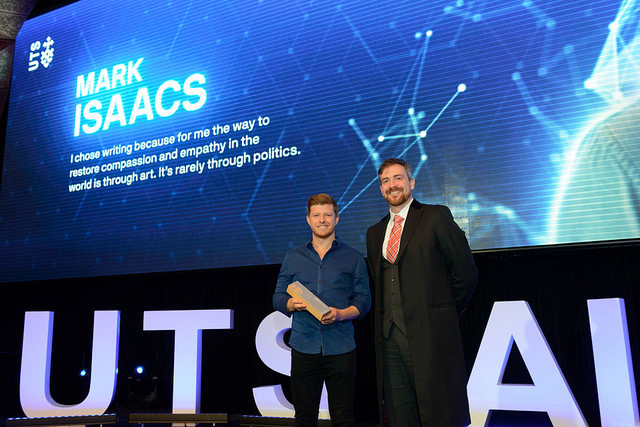The other day I was surprised and humbled to receive the 2017 UTS Community Alumni award. My first thought was that there are many more people who work tirelessly for the betterment of our communities who would be more deserving of such an award. I assumed that in order for me to be selected they must have had very few nominees, and it wasn’t going to be a prestigious event. However, the evening of the awards night was an Oscar-like affair with cancer-researchers, lawyers and prominent businessmen among the other award-winners. What was most impressive about the evening was the focus on social justice. Each award-winner spoke of their privilege, opportunity and good fortune and how they felt the need to give back to the communities that had provided them with the path to success.
I accepted the award (with uncharacteristic nervousness) on behalf of the people I work with and write about: the down-trodden, the oppressed, the displaced, the persecuted. I try to shed light on the dark corners of this world and while I don’t do this work for awards or plaudits, it’s important that we acknowledge and recognise the people at the heart of social justice. Below is a transcript of the speech I made on the evening (trying to keep it to under 2 minutes as requested):
“First and foremost, I’d like to acknowledge the traditional custodians of this land, past, present and future. I look forward to the day our country and our politicians will treat our indigenous population as our brothers and sisters rather than second-class citizens in their own land. I have spent the last few years of my life standing shoulder-to-shoulder with people fleeing from violence, while our politicians have patted themselves on the back for spending billions of dollars torturing their children in offshore prisons. I would like to thank UTS for acknowledging the value in this work and the value of these people.
People don’t do this type of work for awards. They do it because they believe in the power of community, a power based in connection, understanding, relationships and love. The future of our world does not necessarily rely on looking forward, eternally “progressing”. The evolution of humanity can be found in the teachings of our historical texts: to love one another. While our future may end with the dropping of atomic bombs, we can save humanity by harnessing the atomic power of love.”
